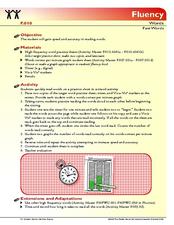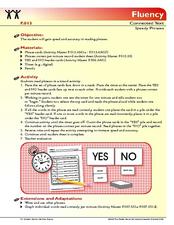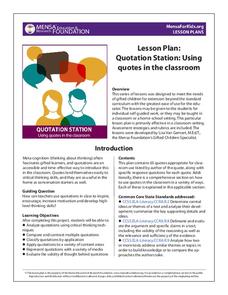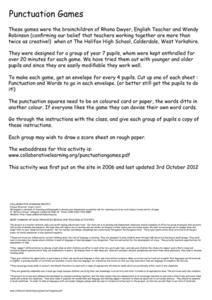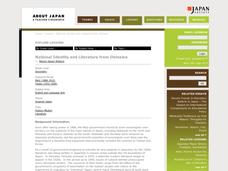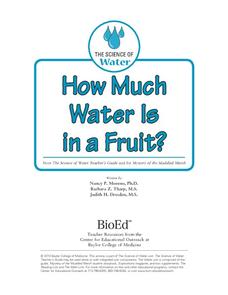Florida Center for Reading Research
Fluency: Words, Speedy Rime Words
Learners time each other as they read as many rime words as possible.
Florida Center for Reading Research
Fluency: Words, Fast Words
Taking turns, pre-readers time each other as they read high-frequency words.
Florida Center for Reading Research
Fluency: Words, Word Climb
Just like climbing a mountain, little learners read to reach the top. They take turns picking high-frequency word cards, reading them, then matching them to the words on their mountain worksheet. They race to reach the top of the...
Florida Center for Reading Research
Fluency: Connected Text, Speedy Phrases
Pairs help each other with reading fluency using phrase flashcards! Learners take turns reading short phrases aloud. They have one minute to read as many correctly as possible while their partner sorts the cards into a yes or no pile. At...
Florida Center for Reading Research
Vocabulary: Morphemic Elements, Getting to the Root of It
Young readers learn how to get at the root of new vocabulary with this fun language arts activity. When working in pairs, children begin by matching unknown vocabulary words to their Greek or Latin roots. When all the vocabulary cards...
Macmillan Education
Happy 40th Birthday Brown Bear
What do you see? Wish a happy birthday to Bill Martin Jr. and Eric Carle's Brown Bear, Brown Bear, What Do You See? The lesson includes six extension activities for the books and its companion stories, including a maze and animal...
MENSA Education & Research Foundation
Quotation Station: Using Quotes in the Classroom
An informative list compiled with quotes, authors, and discussion questions, along with 20 out-of-the-box application ideas, make up the collection of lessons geared to spark dialogue and creative thinking about quotations.
National Park Service
A Natural Resource Called Peace
Get your pupils outside and teach them about peace at the same time! Scholars create a list describing peace, hike outside, add to that list, and later create poems. The exercises support differentiation for your individual classes as...
Curated OER
Rock and Poetry: A Thematic Project
Students become exposed to British poetry. They identify and discuss the thematic connection between a poem and a song of their choice, and enrich their understanding of poetry through an in-depth analysis of literary devices in the song...
Collaborative Learning Project
Punctuation Games
It might not be "Conjunction Junction" but your school room will rock with this punctuation game. Game rules, templates, and background information are all included in the packet.
Japan Society
National Identity and Literature from Okinawa
A lesson plan originally designed around the short story "Mr. Saito of Heaven Building" by Yamanokuchi Baku, this resource provides historical background, discussion questions, and brief writing assignments that help your class explore...
Japan Society
Individual and Society: Natsume Sôseki and the Literature of the Early Twentieth Century
Combine literature and history by examining the work of Japanese writers after the Russo-Japanese war. This resource is for advanced classes with an interest in how literature reflects and reacts to societal change. Activities outlined...
Baylor College
What Makes Water Special?
Get close up and personal with a drop of water to discover how the polarity of its molecules affect its behavior. Elementary hydrologists split and combine water droplets, and also compare them to drops of oil. Much neater than placing a...
Baylor College
What Dissolves in Water?
One of water's claims to fame is as the universal solvent. Young physical scientists experiment to discover which materials dissolve in this special compound. You could never be more prepared for teaching this lesson than by using this...
Baylor College
Can Nutrients in Water Cause Harm?
Ecology candidates culture pond water organisms over a few days time, then they experiment to find out how increasing nutrients affects the population. As part of a unit on water, this exploration gives your class an understanding of how...
Baylor College
What Is a One Part Per Million Solution?
Water may appear to be crystal clear, but there could be dissolved substances present. Lab groups make a one-part-per-million of a food coloring solution to demonstrate this concept. As part of an outstanding unit about water, this...
Baylor College
Dust Catchers
In class, your emerging environmentalists construct dust catchers. They take them home for a week or two, and then bring them back into class to examine under a magnifier. From this activity, they learn what makes up dust and that...
Baylor College
Moving Air
In lab groups, young scientists place aluminum cans with a bubble-solution cap into different temperatures of water to see what size of bubble dome forms. As part of an atmosphere unit in preparation for learning about convection...
Baylor College
Using Heat from the Sun
Let's heat things up! This simple experiment demonstrates for learners the important role the sun plays in providing the earth with energy. Place one cup of water in direct sunlight and one in shade, then take measurements in order to...
Baylor College
Modeling Earth's Atmosphere
Life on Earth is made possible by the unique composition of its atmosphere. Working collaboratively, a scale model is created as young scientists learn about the different layers of gas that surround the planet. Cards are included that...
Baylor College
Finding the Carbon in Sugar
In session one, demonstrate for your class how a flame eventually goes out when enclosed in a jar in order to teach that oxygen is required for combustion. In session two, class members then burn sugar in a spoon to observe how it...
Curated OER
Mission Assignment: Create a Sustainable Car
Students find their dream car by looking in car brochures and magazines. In this language arts lesson, students discuss what their dream car is. Finally, students get into small groups and rank their group's dream cars from highest to...
Baylor College
How Much Water Is in a Fruit?
Compare the volume of an orange to the volume of liquid that can be extracted out of it. Also compare the mass of an apple before and after it has been dried out. In both of these activities, children find that there is an appreciable...
Baylor College
Water: Post-Assessment
Very simply, the science class will discuss what they have learned during The Science of Water unit and take a multiple-choice post-assessment quiz. A few other closing activities are suggested for you to choose from, such as having...



